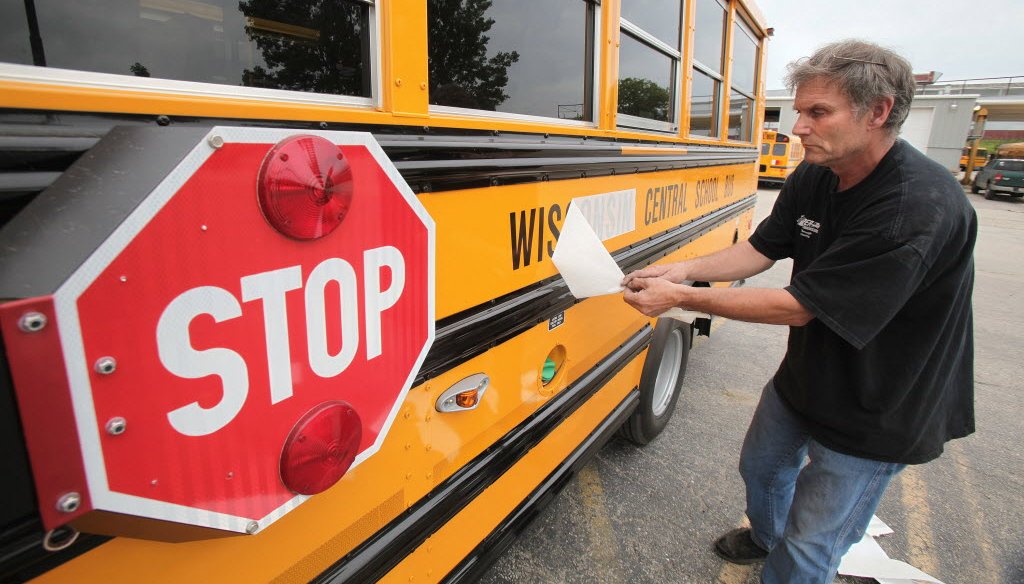Get PolitiFact in your inbox.

The future of Wisconsin schools in the wake of state budget cuts is a central issue in the 2012 gubernatorial recall.
Most of the debate over the impact of Gov. Scott Walker’s budget cuts has focused on how schools fared in the 2011-’12 school year.
But what about the second year of the budget?
Districts already have some picture of what will happen in terms of cuts and layoffs. When we did an in-depth look at 17 Milwaukee-area districts about the impact of the budget and its many changes, we also asked about how they are situated for the future.
It is one of many issues that are at the center of the debate between Walker and his June 5, 2012, recall opponent, Democrat Tom Barrett.
A PolitiFact Wisconsin survey of 17 school districts found some officials have deep concerns about how state funding cuts past and future will affect education long-term.
But officials don’t see fiscal calamity in their 2012-’13 budgets and say the freedom provided by Walker’s union limits will provide new or continued chances to trim back employee costs from school ledgers.
Those controversial changes were a result of Walker and Republican legislators curtailing collective bargaining for most public employees in the budget, allowing districts to force employees to pay more for pensions and health care. The limits will extend to additional districts in 2012-’13, as more labor contracts expire.
But some aren’t eager to push for deeper compensation cuts after many got significant budget relief already.
What does the future hold?
Perhaps most notably, districts will be in a position to eliminate or alter a variety of post-retirement benefits.
In addition, the second year of the state budget will restore a small piece of the cut that knocked down school revenue caps by 5.5 percent in 2011-’12.
Depending on taxing and spending decisions they make, districts are in line for an average 1 percent increase for the next school year.
Glendale-River Hills will get Walker’s budgetary "tools" for the first time, and expects a surplus from the pension and health-care changes, said Larry Smalley, district administrator.
Still, Smalley said Act 10 is no long-term solution to the chronic budget squeeze on local schools, which have been under state-imposed revenue limits for two decades.
He said fixed school expenses, for things such as transportation, continue to rise and unless state funding policy is reformed, deep cuts to salaries and benefits will result.
Milwaukee Public Schools are in a different boat -- teachers have a labor contract through next school year, leaving the district still unable to use Act 10 to knock down labor costs for that group.
That means more cuts there.
Echoing Glendale, Menomonee Falls school officials say Act 10 gave them new budget options, but concerns.
"Act 10 allowed us some flexibility, but the revenue limits remain in place and will continue to challenge our district and district across the state," Jeffrey Gross, the district’s business manager, wrote. "Schools, like health care, are people intensive. If we reduce staff, it impacts classes and programs offered, and the staff ratio for class size."
Menomonee Falls cut its teaching staff 3 percent in 2011-’12, state records show, in part due to slightly declining enrollment. The district offset most of the state reduction in revenue authority through concessions negotiated with teachers as Act 10 was pending.
Kettle Moraine schools officials said their projected budget shortfall for 2012-’13 was much smaller than what they faced going into last year.
Health insurance changes will help balance the budget there. St. Francis reported the same thing.
West Allis-West Milwaukee schools, like several other districts, will get employee compensation savings from a second union, representing support staff, building workers and others.
Retirements are a wild card. In the current year they were above normal in many districts amid all the turmoil over the collective bargaining and budget cuts.
Districts we spoke with did not report planning significant layoffs for next year. That doesn’t mean their staffs won’t get smaller, if they simply don’t replace some retirees.
If that happens, the question becomes: What is the impact on class sizes and school services?
A survey in fall 2011 by the Wisconsin Association of School District Administrators reported that most districts thought they would cut staff in 2012-’13 at the same or greater levels as they had this year.
That survey is dated now; time will tell as schools vote on budgets this summer and finalize staffing for the fall.
There are two ways to look at the question of whether balancing next year’s budget will be "easier" or "harder" for districts, noted South Milwaukee director of business services Blaise Paul.
"From a dollar perspective: we are projected to receive an additional $150,000 under our Revenue Limit next year," Paul said in an email. "To put that in perspective of our $34 million dollar budget, we can increase all expenses by the 150,000 or .44%."
"From a personnel perspective: In 2011-12 employees had take home pay reduced by between 6%-12%. Considering a $150,000 funding increase, there is not much room for staff compensation increases in 2012-13."
Greenfield Superintendent Conrad Farner said the district faces a projected $1.7 million deficit for 2012-’13 -- and has few easy options after having survived on stimulus funds and open enrollment revenue the past two years.
"No reductions in staff/programs are ever easy because they negatively impact students or efficiency," he said. "We made the bulk of our staff reductions five of the previous seven years, so we have few places left to cut."
He added: "We can do things like cut our budget for insurance costs, reduce maintenance budget, reduce utilities budget and cut our budget for short-term borrowing. But if we have bad years in any of those areas, it won’t seem like an ‘easy’ cut."
Our Sources
Interview with Brown Deer Schools director of finance, Emily Koczela, April-May, 2012
Interview with Larry Smalley, Glendale-River Hills Schools, district administrator, April 2012
Interview with Blaise Paul, director of business services, South Milwaukee schools, April-May 2012
Interview with Greendale Schools officials Bill Hughes, superintendent, and Erin Green, director of business services, April 2012
Interview with Shorewood Schools director of business services Mark Boehlke, April 2012
Interview with Whitefish Bay Schools district administrator Mary Gavigan, May 2012
Interview with Shawn Yde, director of business services, Whitefish Bay schools, May 2012
Interview with Germantown Schools district administrator Susan Borden, May 2012
Interview with Greenfield Schools Superintendent Conrad Farner, May 2012
Interview with St. Francis Schools business manager Julie Kelly, April 2012
Interview with Milwaukee Public Schools spokesperson Roseann St. Aubin, April-May 2012
Interview with Fox Point Schools director of business services Amy Kohl, April 2012
Interview with Rachel Boechler, Fox Point-Bayside schools, District Administrator, April 2012
Interview with Keith Brightman, assistant superintendent for finance and operations, Elmbrook Schools, April 2012
Interview with Deborah Rouse, director of business services, West Allis-West Milwaukee Schools, April-May 2012
Interview with Patricia Deklotz, Kettle Moraine Schools Superintendent, April 2012
Interview with Doug Johnson, Whitnall Schools business manager, April 2012
Interview with Menomonee Falls Schools Superintendent Patricia Fagan Greco, and Jeffrey Gross, director of business services, May 2012
Interview with Oak Creek-Franklin Schools Superintendent Sara Burmeister, April 2012
Interview with Mark Smits, Hartford Schools, district administrator, April 2012
Interview with John Johnson, director of Education Information Services, Department of Public Instruction, April-May 2012
Interview with Brian Pahnke, assistant state superintendent, Department of Public Instruction, April-May 2012
Interview with Christina Brey, spokesperson for Wisconsin Education Association Council, May 2012
Interview with Laura Rose, deputy director, Wisconsin Legislature’s Legislative Council, May 2012
Interview with Dan Rossmiller, director of government relations, Wisconsin Association of School Boards, May 2012
Interview with Dave Loppnow, program supervisor, Education and Building Program, Wisconsin Legislative Fiscal Bureau, April 2012
Interview, Mark Conforti, teacher and chief negotiator for Fox Point-Bayside chapter of North Shore United Educators, May 17, 2012











































